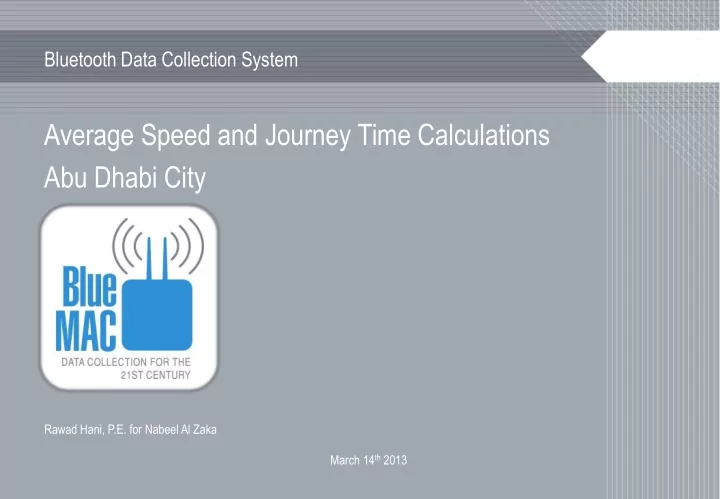

Bluetooth Data Collection System Average Speed and Journey Time Calculations Abu Dhabi City Rawad Hani, P.E. for Nabeel Al Zaka March 14 th 2013
Abu Dhabi Island
Needs of the Abu Dhabi TMC • The Traffic Management Centre in the City of Abu Dhabi does not have access to live dynamic and accurate data. • The data available to the TMC is static and is reliant on Manual Counts, Dry Runs and the use of Floating Car Surveys • No view of Network and Key Corridor Performance. • Systems installed are legacy systems which, and are not integrated in a cohesive manner.
Importance of Data for Abu Dhabi TMC • Network performance KEY indicator • Assist operations to make informed decisions in real-time • Provide real-time travel information that can be shared with Public and other Stakeholders • A tool that can be used to provide a feedback loop regards the effectiveness of signal and corridor optimisation • Demonstrate and measure impact of mitigation for Detours and Road Works Real Time & Informed Reliable Analysis Decisions Data
ITS Strategy and System Architecture Strategy, Architecture and Implementation Action Plan – 2010 - 2030 5.1 REGIONAL ACTIVE TRAFFIC MANAGEMENT AND INFORMATION “ Development of a centralized traffic management, information and coordination centre that will permit integrated operations of regional and urban traffic management “ 5.1.2.2 Travel Time Data Collection and Information “Through set -up of wireless readers that can monitor signals from mobile phones or Bluetooth data from phones or vehicles which are so- equipped. This is often known as ―crowd -sourcing, since the system compares anonymous device address or signal information for consecutive locations and determines the number of matching data points.”
Data Warehouse Vision for Abu Dhabi Buses Road BlueMAC Bluetooth Count Taxis Sensors Sites Multi CCTV GIS Modal Integration Urban Traffic Security Data Warehouse Platform Control Surveillance Police Mobile Public Web Journey Navigation Applications Portal Planner Systems
BlueMAC – A New Type of Detection Device 1 Journey Time BlueMAC System Average Speed Origin-Destination Device 2
Advantages Detects Bluetooth signals in both directions of travel Quick deployment and configuration Mounted on existing street furniture No excavation required Solar powered GSM Communication Self Location Update using GPS
Trials – Phase 1 – Urban Network Determine the accuracy of travel time data collected by the BlueMAC application on arterial roads. 10 BlueMAC devices were placed over 3 main arterials
Validation Methodology Known MAC Address XXXX1BEE15XX
Results (Urban) 99% 95% 99%
Trials – Phase 2 – Inter Urban Network
Trials – Phase 2 – Inter Urban Network Determine the data reliability on highways. • Determine sample size (OD). • Evaluate hardware performance in this region. • Results • 95% Confidence Level for Journey Time Data • 23% Capture Rate (vs RTMS) • Required OD Sample Size
Trials – Phase 2 – Inter Urban Network
Current Deployment (100 Units)
Key Corridors
Current Performance and Results
Current Performance and Results
Current Performance and Results
Reporting – Travel Time • The website can auto-generate reports and display data • The generated graphs have preset filters so the most common requests are displayed in seconds • Two export features are available • Filtered results, from presets or advance filters • Raw data Matches
Travel Time Reports Exported Raw Matches Exported Results
Origin – Destination Reports • The Origin – Destination matrix can be exported to support traffic models and assess the movement of traffic flows; • OD Data could be used for development of traffic models before manual count data is acquired • Validated data could also support certain modeling software such as CUBE
Third Party Integration Access Point Interface • As the DoT are actively consolidating traffic data into projects an API document has been produced to enable third parties to access and extract data from BlueMAC at the machine level. • Third parties are able use the following methods to obtain data from the BlueMAC Database server; • SOAP • REST-XML • REST-JSON
Supporting Documentation Manuals and Guides • To support the BlueMAC project there are four documents that outline all aspects of the systems they include, The Functional Design Specification, Hardware and Software Manual, Maintenance Handbook and API Guide
Conclusion “You can't expect to meet the challenges of today with yesterday's tools and expect to be in business tomorrow”. Nelson Jackson, 1972
Recommend
More recommend